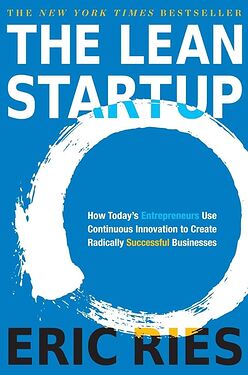See other Book TLDRs relevant to Gitcoin:
Since I value Learning in Public I’d welcome others to post reviews of relevant books or other resources too ![]()
The Lean Startup: How Today’s Entrepreneurs Use Continuous Innovation to Create Radically Successful Businesses is a book by Eric Ries that presents a systematic, scientific approach for creating and managing successful startups in an age when companies have to innovate more than ever.
Published in 2011, it has become a foundational text for startup methodologies, influencing entrepreneurs and business leaders worldwide.
I have relied on the concepts for years, and expect that upcoming rapid prototyping work will rely on this work.
Here’s an overview of its key concepts and principles:
5 Key takeaways
- There is a process to entrepreneurship that can be learned.
- The goal of a startup is to figure out the right thing to build – the thing customers want and will pay for – as quickly as possible.
- Customers do not tell us what they want. They reveal the truth through their action or inaction.
- Test and validate your value and growth hypothesis.
- Use MVPs to cycle through the Build-Measure-Learn feedback loop as fast as possible.
Core Principles
- Build-Measure-Learn Loop: The heart of the Lean Startup methodology is the build-measure-learn feedback loop. Startups should start with a minimum viable product (MVP) to begin the learning process as quickly as possible. After building the MVP, startups measure its effectiveness in the market using actionable metrics rather than vanity metrics. Based on these measurements, startups learn and decide whether to pivot (shift course) or persevere.
- Minimum Viable Product (MVP): The MVP is the simplest version of a product that the startup can create to start the build-measure-learn loop. It allows the company to collect the maximum amount of validated learning about customers with the least effort.
- Validated Learning: This is a process of demonstrating empirically that a team has discovered valuable truths about a startup’s present and future business prospects. It emphasizes learning over just building and selling products.
- Innovative Accounting: To improve and validate their business model, startups need a new kind of accounting designed for startups—and the metrics that come from it.
- Pivot or Persevere: Based on feedback from the MVP, startups decide whether to pivot (make a fundamental change to the product) or persevere (keep improving on the current course).
Impact and Application
The Lean Startup methodology aims to eliminate wasteful practices and increase value-producing practices during the initial phases of a company by focusing on what customers really want. This allows startups to be more flexible and adapt to changes, reducing the cost and time to market. The approach encourages startups to test their vision continuously, adapt, and adjust before it’s too late, making it highly relevant in today’s fast-paced, technology-driven world.
Criticism and Limitations
While widely celebrated, the Lean Startup methodology has also faced criticism, particularly for its focus on speed and efficiency possibly at the expense of creativity and visionary leadership. Critics argue that it may lead to short-term thinking and might not be suitable for all types of businesses or industries, especially those that require long-term development and research.
Despite these criticisms, “The Lean Startup” remains a seminal work in the field of entrepreneurship, offering valuable insights and tools for startups aiming to build sustainable, customer-centric businesses in uncertain markets.
Get it here. I will likely also bring copies to ETHDenver!
